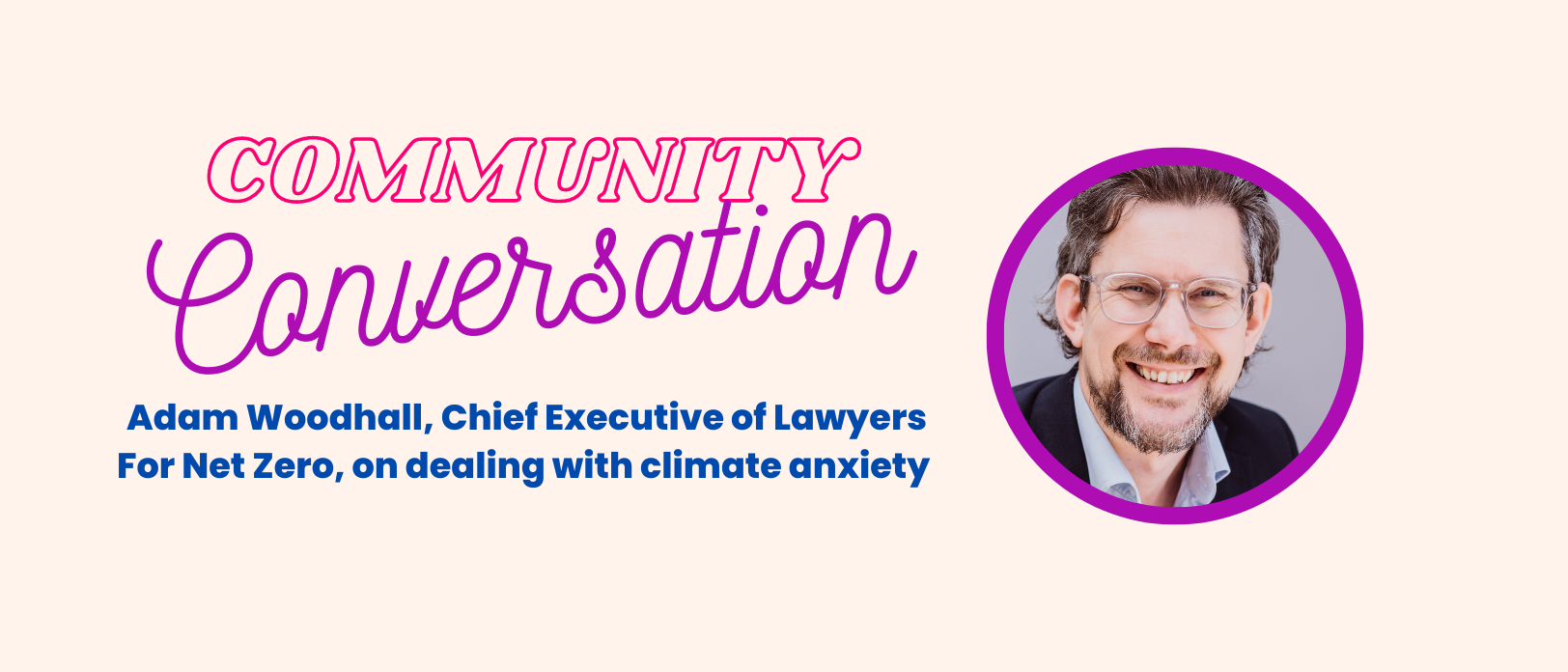Three things we learned about dealing with climate anxiety by taking action
For our irregular series of Community Conversations - and in the midst of an unprecedented heatwave in the UK - we spoke with campaigner Adam Woodhall of Lawyers for Net Zero about climate anxiety, and how we can take action as individuals and collectively.
1. Anxiety is a rational response to the climate crisis
“Anxiety is a perfectly rational response to the growing risks that we are seeing. And just like anxiety itself, whatever form of anxiety, we shouldn't hide from it, or ignore it, or try and kind of push it away, because that doesn't help…
“The interesting thing is how people respond to the concept of our own mortality. Now, we're all gonna die sometime, and so are our loved ones. And so is everyone, actually. But one of the things is how do we deal with that, but then the other side that is - for me, that has caused my sort of climate anxiety - is not the death of me or my loved ones. It's more the untimely death of maybe me and particularly loved ones, because actually, the climate crisis predicts that if we continue on kicking out greenhouse gases, and also doing all the ecological damage, that our society's foundations will be undermined. We're already starting to see that - there's quite a lot of evidence that the Syrian civil war, in part, what led to it was actually a once-in-1000-year drought which lasted for a long time. And so because of an insecure societal situation, that society imploded into civil war, unfortunately, there's still lots of problems there now. I don't want that to happen.
“I've done some work on my personal sort of mortality. But what I want to, when I draw my dying breath, I want to see a world that is still functioning and still has a great societal engagement going on. I don't want to see a society collapsing around me. And potentially, the reason why I'm dying, is because it's collapsing. I might have a personality that naturally thinks very big, and that's quite a big thing. But I think different people's anxiety will regard climate at different levels, and I think a lot of it will be that sense of feeling out of control and having some form of impending doom around it.
2. Action is what drives belief, not the other way around
“The basis of Lawyers for Net Zero is the theory of change that we have comes from the understanding that action is what drives belief, rather than the other way around. Most people think that the way to solve the climate crisis is you need to get everybody believing that climate change is happening, and then everybody will then take action based on that. Now, that's what a lot of initiatives have been doing for the last 20 plus years, and it's not really moved the dial that much. It's not that it's not done anything, it's just not moved the dial much. But actually, there's lots of evidence that if you get people doing things which are meaningful, which are above and beyond, they start off not too ambitious, so then you don't fall over, because you've just not achieved it. You know, don't try and be Prime Minister of the UK because you want to change the green policies, it's not gonna happen overnight. Start something and then build as fast as you can.”
3. It takes more than a green committee for the office
“Yes, it's good to get your green committee at work going. But what I'm talking about here is that if you're in the finance team, it's asking questions about how we're spending our money, are we using renewable energy, etc. But then also, if you're in procurement, what we're spending our money on? If you're the chief executive, etc.
Lawyers for Net Zero is for in-house lawyers - so we only look at the lawyers that work in the big organisations like corporations, government. How can you use your influence to support the climate transition in that way? And so the core of our work in our Impact programme, is what we call our ‘champions groups’, which is small groups, individuals, and the key thing is it's focused on action. We don't actually talk about the climate crisis, the challenge, and what actually the feedback that we get - and this year that we first started delivering the full programme; last year was piloting - and the feedback has been fantastic because people have felt really empowered to do stuff and create that change, which has been, you know, wonderful to see. Because when it comes down to it, the best antidote to climate anxiety is to do something meaningful. Start, but don't overstretch yourself, don't get anxious because you're not doing enough yet. Just keep on doing.”
Get the full conversation
Watch the conversation on YouTube (it's just under 20 minutes long - transcript available in our community), and please do continue this conversation in our community platform. Not yet a member? Request to join here.

